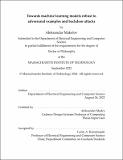| dc.description.abstract | In the past decade, machine learning spectacularly succeeded on many challenging benchmarks. However, are our machine learning models ready to leave this lab setting and be safely deployed in high-stakes real-world applications? In this thesis, we take steps towards making this vision a reality by developing and applying new frameworks for making modern machine learning systems more robust. In particular, we make progress on two major modes of brittleness of such systems: adversarial examples and backdoor data poisoning attacks.
Specifically, in the first part of the thesis, we build a methodology for defending against adversarial examples that is the first one to provide non-trivial adversarial robustness against an adaptive adversary.
In the second part, we develop a framework for backdoor data poisoning attacks, and show how, under natural assumptions, our theoretical results motivate an algorithm to flag and remove potentially poisoned examples that is empirically successful. We conclude with a brief exploration of preliminary evidence that this framework can also be applied to other data modalities, such as tabular data, and other machine learning models, such as ensembles of decision trees. | |
